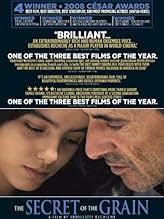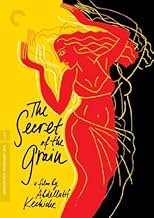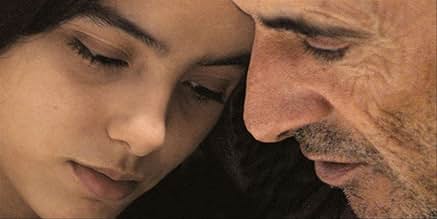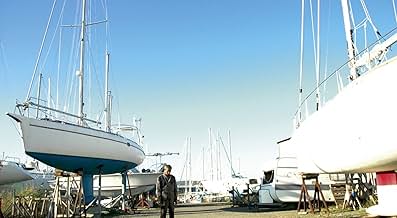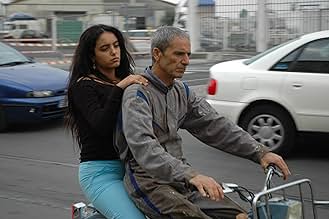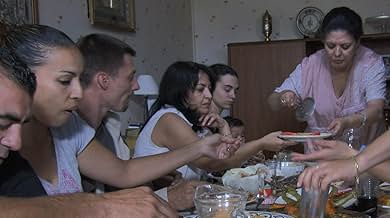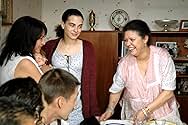IMDb रेटिंग
7.4/10
8.1 हज़ार
आपकी रेटिंग
अपनी भाषा में प्लॉट जोड़ेंIn southern France, a Franco-Arabic shipyard worker along with his partner's daughter pursues his dream of opening a restaurant.In southern France, a Franco-Arabic shipyard worker along with his partner's daughter pursues his dream of opening a restaurant.In southern France, a Franco-Arabic shipyard worker along with his partner's daughter pursues his dream of opening a restaurant.
- निर्देशक
- लेखक
- स्टार
- पुरस्कार
- 19 जीत और कुल 9 नामांकन
Nadia Taoul
- Sarah
- (as Nadia Taouil)
फ़ीचर्ड समीक्षाएं
Cous Cous is set on the coast of Southern France in a coastal community where traditional industries are dying away. The void opening up with the decline of fishing and boat making industries is considerable, and the sprinkling of tourist interest in the area does little to salve these wounds. The malaise and despondency of the community is encapsulated in the person of Slimane, a taciturn divorcée who is told at the start of this film that he will henceforth receive only part-time employment at the scrapyard where he makes his living.
In the early stages of the film we are also introduced to Slimane's large and diverse family. The family minus Slimane is first brought together for a meal of fish and couscous at the household of Souad, Slimane's former wife. This is the first of several long and engrossing commensal scenes. The rapid, witty dialogue and the skillful close-up camera-work filmed around and among the diners create a remarkable intimacy between the actors and the viewer, so that very soon we are immersed in the family's intrigues and laughing at their bawdy humour.
However, the family is more often in disharmony. The children yearn for Slimane and Souad to resolve their differences, but Slimane is living in a hotel elsewhere in town. The proprietor of the hotel is his new partner and her daughter, Rym, is a close friend. Slimane's children disapprove openly of this situation, but at the same time they have their own problems to face up to, especially the wayward behaviour of Hamid, one of Slimane's sons, who frequently cheats on his fragile wife.
Slimane's despondency intensifies in the wake of his enforced semi-retirement from the scrapyard: he regrets that his family is divided and wishes that he had used his life to create something, to create a legacy for his children. It is in the face of this despair and with the help of Rym, the daughter of the hotel proprietor, that Slimane resolves to create a restaurant on a derelict boat a restaurant for which his ex-wife will cook and which his children will serve in. Rather than turning the rest of the film into a modern-day fairytale, director Abdel Kechiche remains levelheaded and keeps his camera trained on the complex and often strained web of relationships amongst the family members of Slimane's divided family. It is a slow and difficult struggle for Slimane to realise his goal, but Kechiche shows little of the construction of this ship in this long (two and a half hours) film.
In the final stages of the film Slimane is desperate to secure funding for his project and decides to host a grand opening of the restaurant with many eminent local personalities on the guestlist. The dramas and calamities in the protracted finale seem somewhat at odds with the first two-thirds of the film, which is low on drama and feels unstaged (indeed there are many non-professional actors in the cast and probably a considerable amount of improvisation). Nevertheless, as Slimane struggles to ensure that the dinner reaches the diners and the grand opening morphs awkwardly into a long-drawn-out party, the film climbs to a thrilling crescendo and a devastatingly abrupt ending.
In the early stages of the film we are also introduced to Slimane's large and diverse family. The family minus Slimane is first brought together for a meal of fish and couscous at the household of Souad, Slimane's former wife. This is the first of several long and engrossing commensal scenes. The rapid, witty dialogue and the skillful close-up camera-work filmed around and among the diners create a remarkable intimacy between the actors and the viewer, so that very soon we are immersed in the family's intrigues and laughing at their bawdy humour.
However, the family is more often in disharmony. The children yearn for Slimane and Souad to resolve their differences, but Slimane is living in a hotel elsewhere in town. The proprietor of the hotel is his new partner and her daughter, Rym, is a close friend. Slimane's children disapprove openly of this situation, but at the same time they have their own problems to face up to, especially the wayward behaviour of Hamid, one of Slimane's sons, who frequently cheats on his fragile wife.
Slimane's despondency intensifies in the wake of his enforced semi-retirement from the scrapyard: he regrets that his family is divided and wishes that he had used his life to create something, to create a legacy for his children. It is in the face of this despair and with the help of Rym, the daughter of the hotel proprietor, that Slimane resolves to create a restaurant on a derelict boat a restaurant for which his ex-wife will cook and which his children will serve in. Rather than turning the rest of the film into a modern-day fairytale, director Abdel Kechiche remains levelheaded and keeps his camera trained on the complex and often strained web of relationships amongst the family members of Slimane's divided family. It is a slow and difficult struggle for Slimane to realise his goal, but Kechiche shows little of the construction of this ship in this long (two and a half hours) film.
In the final stages of the film Slimane is desperate to secure funding for his project and decides to host a grand opening of the restaurant with many eminent local personalities on the guestlist. The dramas and calamities in the protracted finale seem somewhat at odds with the first two-thirds of the film, which is low on drama and feels unstaged (indeed there are many non-professional actors in the cast and probably a considerable amount of improvisation). Nevertheless, as Slimane struggles to ensure that the dinner reaches the diners and the grand opening morphs awkwardly into a long-drawn-out party, the film climbs to a thrilling crescendo and a devastatingly abrupt ending.
I have heard this film being compared to Eat Drink Man Woman, which is fair enough, if not slightly deceptive. Sure, there's a similar veneration for the art of cooking and how this draws and binds families. But the film casts a wider net than this may suggest. For me, it strongly resembles the humanistic and naturalistic stories of Robert Guédiguian, particularly La ville est tranquille (The Town is Quiet).
The actors are largely non-professionals. The use of long takes, including long stretches of dialogue, is very impressive and suggests that some of the script may be improvisational. I liked the chit-chat, the small details of daily life (like toilet-training a child), that films normally gloss over.
The film has a documentary look and feel and parts are like a fly-on-the-wall at a family gathering. For me, the importance of this is to convey how human this family is, with a rich and warm cultural heritage. In particular, it renders as impotent, irrational fears of Muslim culture.
The film works on multiple levels because it taps into the universal everyday concerns that potentially touch us all in one form or another: prejudice against immigrants, attitudes towards Islam post 9-11, globalisation, ageism in the workforce, the effects of poverty, family breakdown and more. Yet, importantly, the film is not preachy but merely presents life in a matter-of-fact way.
The female performances in the film are particularly affecting, especially the young Hafsia Herzi playing Rym, the daughter of Slimane's lover, and Leila D'Issernio who plays his Russian daughter-in-law.
At 148 minutes, the film is quite long, though this is not apparent until the final scene, which seems to be prolonged in real-time for a particular effect. On paper, the story looks like something we've seen before, but avoids all the clichés we might expect. I loved it.
The actors are largely non-professionals. The use of long takes, including long stretches of dialogue, is very impressive and suggests that some of the script may be improvisational. I liked the chit-chat, the small details of daily life (like toilet-training a child), that films normally gloss over.
The film has a documentary look and feel and parts are like a fly-on-the-wall at a family gathering. For me, the importance of this is to convey how human this family is, with a rich and warm cultural heritage. In particular, it renders as impotent, irrational fears of Muslim culture.
The film works on multiple levels because it taps into the universal everyday concerns that potentially touch us all in one form or another: prejudice against immigrants, attitudes towards Islam post 9-11, globalisation, ageism in the workforce, the effects of poverty, family breakdown and more. Yet, importantly, the film is not preachy but merely presents life in a matter-of-fact way.
The female performances in the film are particularly affecting, especially the young Hafsia Herzi playing Rym, the daughter of Slimane's lover, and Leila D'Issernio who plays his Russian daughter-in-law.
At 148 minutes, the film is quite long, though this is not apparent until the final scene, which seems to be prolonged in real-time for a particular effect. On paper, the story looks like something we've seen before, but avoids all the clichés we might expect. I loved it.
10jean-no
Abdellatif Kechiche did very well with his previous movie "L'Esquive". But here we have even better. The story is simple : I'd say it is mostly about dignity, sacrifice and family love. The acting is brilliant. Habib Boufares is perfect, the young Hafsia Herzi is astounding, especially for the end of the movie. The actors are mostly non-professional people but the script is very well written and the characters are well defined, so this "amateurism" does great and helps the audience's immersion. The cinematography is very special (but never disturbing), with a lot of very close close-ups. The camera is "natural" as with Casavettes, but not "drunk", it is not a pain to watch and you don't get sea sick. The whole movie reminded me the Italian neo-realism and also a little of Renoir. Some people mention Pialat. It's a quite long movie but you don't feel it while watching, you just realize it after.
It's the third movie of Abdellatif Kechiche (coming after "La Faute à Voltaire", and "L'Esquive"). All these movies deal in a way or another with the life of Tunisian immigrants in France.
This time in "Couscous" the director wanted to show his own background, the universe of his own family, Tunisian immigrants living in Nice, and especially he wanted to bring a tribute to his father, the man who had struggled for all his life to transmit a sense to all of them. It was not to be a biographical film, what Mr. Kechiche was looking for was to catch an atmosphere, and I would say, to catch the ethos.
The shootings have not been done in Nice, as the director feared to become much too sentimental. The chosen location was Sète instead, a small Mediterranean town, where the fishermen leave on their boats each morning and sometimes reach North Africa or the Asian borders, a town struggling with the same issues as everywhere in Europe nowadays: decline of production and unemployment, with the small shipyard challenged by concurrence, the fishing industry challenged the same.
The director had intended to ask his father to play in the movie and started to look for funding and to organize the team. Meanwhile the father passed away. Mr. Kechiche decided then to put a Tunisian actor in the role of the father. It was Mustapha Adouani, whom the director knew very well. Exactly when shootings were to start, Mr. Adouani fell gravely ill (he died after a few months), so they had to find on the spot another solution.
And the solution they found proved brilliant: they hired a non-actor, Habib Boufares, a worker from Nice, a lifelong friend of the father. The role fitted to him as a glove! Actually almost the whole team is of non-actors. The screenplay details were very loosely followed, the director left to the cast the full liberty to improvise. They were playing their own kind of life after all! And they lived their life there, in front of the camera (it was a hand-held camera , to not impede the non-actors in any way). This movie breathes trough all its pores of life, of authenticity, of immediacy! There are only a few professional actors in the cast. Hafsia Herzi (a young actress showing stamina and commitment) plays the step-daughter of the father, a very determined girl, sincerely attached to him and giving full support in difficult moments. There is also Alice Houri, bringing in a secondary role force and sincerity.
I have read the reviews to this movie. Many of them are very critical. The movie is excessively long, they say, and there are a lot of scenes that could have been much shorter without loosing anything. It is a 150 minutes film: one third is devoted to a dinner in family; the mother has prepared fish couscous (you could guess), an endless chat is about anything and nothing; a second third is devoted to a dinner on a boat-restaurant, where everybody is waiting for the main course (fish couscous, you betcha).
Well, it depends on your taste to like this movie or not (it goes the same with the couscous as a dish). I think the director took this risk, to let each scene to unfold on its own, regardless how long it was taking, for the sake of authenticity. He was interested in catching the universe of that community of Tunisian immigrants, in rendering it as natural as it really is; to get this way the ethos of that world. And he needed for this to not interfere in any way: neither by screenplay, nor by camera, nor by editing.
It is a family risking to disintegrate: the parents are separated, one of the sons is cheating his wife, there are tensions with the step-daughter. What keep them strong is the recourse to their specificity when need is: their cuisine, the wonderful plates with fish couscous. And their music and dance, in the most dramatic moments. There is a long scene of belly dance at the end of the movie: I don't want to say more, to not spoil the story. These guys speak only French and follow the French system of values. They keep however their cultural origins as assets.
Some reviewers mentioned "Eat Drink Man Woman" of Ang Lee: there also it is cuisine that keeps family against disintegration. I would mention also in this context "A Touch of Spice": a Greek family forced to leave Istanbul will keep their specific identity by keeping to "Politiky Kouzina", the way Greeks from Istanbul use spices in their dishes.
For me "Couscous" called in mind also "35 Rhums", another French movie whose heroes also belong to an ethnic minority in France.
I think somehow the family in "Couscous" and the movie itself resemble: both could disintegrate, both keep ultimately strong, the family keeping to their cuisine, the movie by keeping to the authenticity of this universe and by getting their ethos.
This time in "Couscous" the director wanted to show his own background, the universe of his own family, Tunisian immigrants living in Nice, and especially he wanted to bring a tribute to his father, the man who had struggled for all his life to transmit a sense to all of them. It was not to be a biographical film, what Mr. Kechiche was looking for was to catch an atmosphere, and I would say, to catch the ethos.
The shootings have not been done in Nice, as the director feared to become much too sentimental. The chosen location was Sète instead, a small Mediterranean town, where the fishermen leave on their boats each morning and sometimes reach North Africa or the Asian borders, a town struggling with the same issues as everywhere in Europe nowadays: decline of production and unemployment, with the small shipyard challenged by concurrence, the fishing industry challenged the same.
The director had intended to ask his father to play in the movie and started to look for funding and to organize the team. Meanwhile the father passed away. Mr. Kechiche decided then to put a Tunisian actor in the role of the father. It was Mustapha Adouani, whom the director knew very well. Exactly when shootings were to start, Mr. Adouani fell gravely ill (he died after a few months), so they had to find on the spot another solution.
And the solution they found proved brilliant: they hired a non-actor, Habib Boufares, a worker from Nice, a lifelong friend of the father. The role fitted to him as a glove! Actually almost the whole team is of non-actors. The screenplay details were very loosely followed, the director left to the cast the full liberty to improvise. They were playing their own kind of life after all! And they lived their life there, in front of the camera (it was a hand-held camera , to not impede the non-actors in any way). This movie breathes trough all its pores of life, of authenticity, of immediacy! There are only a few professional actors in the cast. Hafsia Herzi (a young actress showing stamina and commitment) plays the step-daughter of the father, a very determined girl, sincerely attached to him and giving full support in difficult moments. There is also Alice Houri, bringing in a secondary role force and sincerity.
I have read the reviews to this movie. Many of them are very critical. The movie is excessively long, they say, and there are a lot of scenes that could have been much shorter without loosing anything. It is a 150 minutes film: one third is devoted to a dinner in family; the mother has prepared fish couscous (you could guess), an endless chat is about anything and nothing; a second third is devoted to a dinner on a boat-restaurant, where everybody is waiting for the main course (fish couscous, you betcha).
Well, it depends on your taste to like this movie or not (it goes the same with the couscous as a dish). I think the director took this risk, to let each scene to unfold on its own, regardless how long it was taking, for the sake of authenticity. He was interested in catching the universe of that community of Tunisian immigrants, in rendering it as natural as it really is; to get this way the ethos of that world. And he needed for this to not interfere in any way: neither by screenplay, nor by camera, nor by editing.
It is a family risking to disintegrate: the parents are separated, one of the sons is cheating his wife, there are tensions with the step-daughter. What keep them strong is the recourse to their specificity when need is: their cuisine, the wonderful plates with fish couscous. And their music and dance, in the most dramatic moments. There is a long scene of belly dance at the end of the movie: I don't want to say more, to not spoil the story. These guys speak only French and follow the French system of values. They keep however their cultural origins as assets.
Some reviewers mentioned "Eat Drink Man Woman" of Ang Lee: there also it is cuisine that keeps family against disintegration. I would mention also in this context "A Touch of Spice": a Greek family forced to leave Istanbul will keep their specific identity by keeping to "Politiky Kouzina", the way Greeks from Istanbul use spices in their dishes.
For me "Couscous" called in mind also "35 Rhums", another French movie whose heroes also belong to an ethnic minority in France.
I think somehow the family in "Couscous" and the movie itself resemble: both could disintegrate, both keep ultimately strong, the family keeping to their cuisine, the movie by keeping to the authenticity of this universe and by getting their ethos.
In his sixties, Slimane (Habib Boufares) is a disillusioned and tired man and, since his divorce from his wife, he has become a kind of free electron within his microcosm reduced to a community from North Africa. After an abrupt dismissal from the shipyard of the port of Sète, he quickly and naturally feels a sense of uselessness until having the unexpected idea and the strong desire to open a couscous restaurant, on a boat destined to scrap. His whole universe (family and friends) will progressively weld around this project which has become for everyone the symbol of a quest for a better life.
The director Abdellatif Kechiche is a perfectionist and creates with La graine et le mulet (2007) a film of atmosphere. It obviously takes time to describe the environment, the characters, the relationships between them, the issues, ... and thus allow the audience to immerse themselves in a universe that is not necessarily his (mine in all case): this is also the magic of cinema. Thus, the pace is deliberately slow, even very slow, with some scenes that may seem disproportionately long or even unnecessary. Nevertheless, from the beginning to the end, I was in total empathy with this Slimane.
As a synthesis: a movie as endearing as moving, as poignant as revitalizing. 7/8 of 10
The director Abdellatif Kechiche is a perfectionist and creates with La graine et le mulet (2007) a film of atmosphere. It obviously takes time to describe the environment, the characters, the relationships between them, the issues, ... and thus allow the audience to immerse themselves in a universe that is not necessarily his (mine in all case): this is also the magic of cinema. Thus, the pace is deliberately slow, even very slow, with some scenes that may seem disproportionately long or even unnecessary. Nevertheless, from the beginning to the end, I was in total empathy with this Slimane.
As a synthesis: a movie as endearing as moving, as poignant as revitalizing. 7/8 of 10
क्या आपको पता है
- ट्रिवियाShooting was supposed to start in the summer of 2005 but one of the leading actors was sick, which resulted in a major delay. Thus, filming actually started on 5 September 2005 and was still running by 16 January 2006. The set was on a boat in the port of Sète for at least six weeks from October to December 2006. Outside temperatures were very low, as opposed to what they should have been if schedule could have been held. This led the production to set up large tents near the boat with heating systems for the actors and extras to remain comfortable between takes.
- कनेक्शनFeatured in Maltin on Movies: Flipped (2010)
- साउंडट्रैकEl fan hob wa imane
Written by Mohamed Abdel Wahab and Hussein El Sayed
टॉप पसंद
रेटिंग देने के लिए साइन-इन करें और वैयक्तिकृत सुझावों के लिए वॉचलिस्ट करें
- How long is The Secret of the Grain?Alexa द्वारा संचालित
विवरण
बॉक्स ऑफ़िस
- US और कनाडा में सकल
- $86,356
- US और कनाडा में पहले सप्ताह में कुल कमाई
- $9,850
- 28 दिस॰ 2008
- दुनिया भर में सकल
- $1,47,76,783
- चलने की अवधि2 घंटे 31 मिनट
- रंग
- ध्वनि मिश्रण
- पक्ष अनुपात
- 1.85 : 1
इस पेज में योगदान दें
किसी बदलाव का सुझाव दें या अनुपलब्ध कॉन्टेंट जोड़ें


